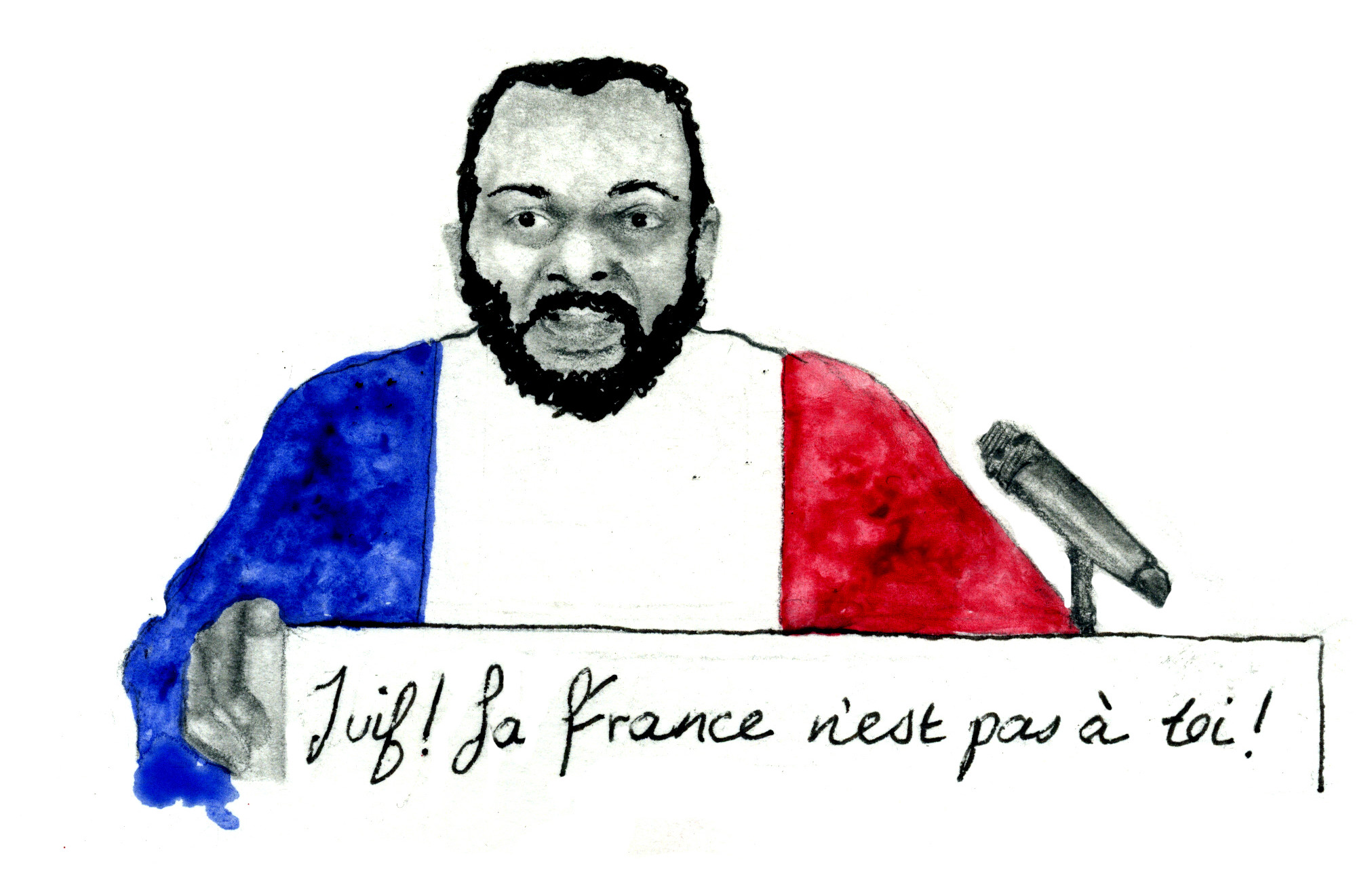France’s age-old predilection for anti-Semitism has strengthened, due in part to the proliferation of hateful ideas and memes throughout the Internet. The Jour de Colère bears witness to this trend. Since the movement first started mobilizing in November 2013, it has gathered around 23,000 fans and followers on social media. The movement centers on discontent with the country’s leadership, but the Internet’s capacity for mobilization has catalyzed the effective organization of subgroups, including one of anti-Semitic extremists. French-Cameroonian comedian Dieudonné M’bala M’bala, the icon of a new wave of anti-Semitism in France, called for fans to join the protests on his Facebook page, and they did.
Already a controversial subject in France, Dieudonné’s viral anti-Semitism has demonstrated the speed with which inflammatory figures can use the Internet to gather support. Dieudonné invented a new logo for his brand of anti-Semitism: the quenelle, named after a French dumpling dish. The gesture is performed by pointing one arm diagonally downwards while touching the shoulder with the opposite hand. It clearly resembles an inverted Nazi salute, but subverts French laws that ban the original gesture. Dieudonné, however, maintains that it is no more than an “up yours” to the establishment.
Ambiguity is one of Dieudonné’s trademarks. He prefers to brand himself as an anti-Zionist, not an anti-Semite. He avoids making unequivocally anti-Semitic remarks, instead choosing veiled threats, such as those made toward French-Jewish journalist Patrick Cohen, a vocal critic of Dieudonné. “I am not sure he will have time to pack his suitcase. When I hear him speak, Patrick Cohen, I say to myself, you see, the gas chambers…too bad,” said Dieudonné. Alexander Stille, a writer for The New Yorker, notes that “this is classic Dieudonné…the sentence is grammatically disconnected and…‘too bad’…gives him some plausible deniability.” The quenelle’s uncertain placement between hate speech and meme has given it its own ambiguity. NBA player Tony Parker, a French expatriate, has come under scrutiny after being photographed making the gesture, but claims no knowledge of its anti-Semitic connotations.
Some may argue that the quenelle, like many things one can find on the Internet, is distasteful but relatively harmless. But Dieudonné’s record of hate speech, his 2009 candidacy for the European Parliament under the anti-Zionist party and the quenelle’s similarity to the Nazi salute suggest otherwise. Pictures of his supporters making the gesture — including some at Jewish sites and former Nazi concentration camps — abound on the Internet. One depicts an individual making the pose in front of the Ozar Hatorah Jewish School in Toulouse, where three Jewish children and their rabbi were gunned down in 2012. But the French government has begun to step in. Last September, two French soldiers were disciplined for performing the quenelle in front of a Paris synagogue and then posting the images online. Hollande’s administration removed some of Dieudonné’s YouTube videos and encouraged towns to cancel his shows, which Marseille, Lyon and several others later did.
Despite interference by the French government, supporters have reposted Dieudonné’s videos. Dieudonné’s movement is far from the first instance of widespread anti-Semitic hatred online in France. The hashtag #UnBonJuif, or #AGoodJew, which incited a number of Holocaust-skewering jokes on Twitter, was removed through the intervention of the French Jewish student union. Two years later, the quenelle has replaced it, showing that questions on how to stymie hate speech online are far from answered.
For all its usefulness, the Internet could quickly undo years of progress. In a world where Internet content is created and spread in the blink of an eye, it is terrifyingly simple for one man’s hateful gesture and message to become commonplace — even if it is not well understood. Some vigilantes have provided unorthodox responses, like hacking into Dieudonné’s website and publishing the list of his supporters. But while the Internet is used by some to fight the rising movement, other signs are not so promising. Two years ago, French Jewish organizations clocked an 84 percent spike in physical and verbal acts of racism; the accelerating pace is exacerbated by use of the Internet as a dissemination tool for hateful words and images. Given elements of its anti-Semitic past, if France continues to allow this kind of discourse to become acceptable, the menace will no longer be virtual.
Art by Elizabeth Berman
